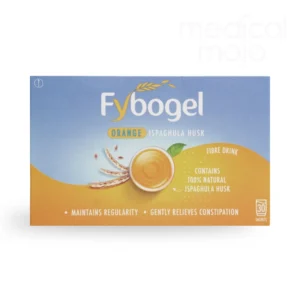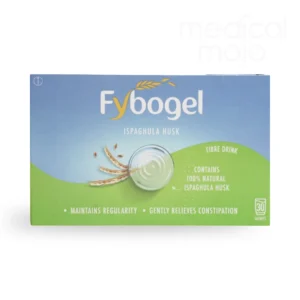In this article, we look at bowel movements, the impact of fibre on creating a healthy routine, how to get more into your diet naturally, and how supplements like Fybogel can help you get back to a regular rhythm.
Table of contents
- How many bowel movements is normal?
- What is fibre?
- The perfect couple – fibre and water
- Does exercise help with bowel movements?
- Fybogel – what is it, and how does it work?
- What flavours is Fybogel available in?
- When not to use Fybogel
- Red flags and when to consider an urgent visit to the doctor
- Your questions answered:
- Interested in maintaining your gut health?
-
 Fybogel Orange Sachets£15.49 – £92.94
Fybogel Orange Sachets£15.49 – £92.94 -
 Fybogel Lemon Sachets£15.49 – £92.94
Fybogel Lemon Sachets£15.49 – £92.94 -
 Fybogel Plain Sachets£15.49 – £92.94
Fybogel Plain Sachets£15.49 – £92.94
How many bowel movements is normal?
We all need fibre to poop regularly without pain or strain, and it contributes to establishing a healthy pattern of bowel movements. But how many bowel movements is considered normal? When does the number of bowel movements become too infrequent, and is it then classed as constipation?
Well, the frequency of bowel movements can vary widely among healthy individuals, and there is a broad “normal” range. Generally:
- Normal frequency: between three times per day to three times per week.
- Individual variation: Some people may have daily bowel movements, while others might go every few days.
The key indicator of a healthy bowel routine is consistency with minimal discomfort, straining, or pain. Your stools should be soft but well-formed.
In order to help regulate your bowel movement, you need fibre in your diet.
What is fibre?
Fibre is a type of carbohydrate found in plants that the human body cannot fully digest. It comes in two main types: soluble and insoluble.
Soluble fibre dissolves in water and forms a gel-like substance, helping to lower blood cholesterol and glucose levels.
Insoluble fibre adds bulk to stool, aiding in regular bowel movements. It is the insoluble stuff that you need to help you poop regularly and with ease.
Did you know that dietary fibre not only helps with regular bowel movement, it also supports gut health and is associated with a reduced risk of chronic conditions like heart disease, diabetes, and certain cancers?
What foods are rich in fibre?
High-fibre foods can help promote regular bowel movements by adding bulk and softening stools. Some excellent sources of fibre include:
- Fruits such as apples and pears (with skin), berries and prunes (which are often used as a natural laxative due to their high fibre and sorbitol content)
- Vegetables such as leafy greens (spinach, kale) and sweet potatoes (with skin)
- Whole Grains such as oats and oatmeal, whole-grain bread, brown rice, barley, whole-grain pasta, and bulgur and high-fibre cereals
- Legumes, which are basically lentils and beans (not the tinned variety in a tomato sauce!)
- Nuts and Seeds, including almonds, walnuts, flaxseeds and sunflower seeds
If this all sounds too healthy, you will be glad to hear the unsweetened variety of popcorn is also fibre-rich.
So to maintain good gut health (and keep chronic diseases at bay), try increasing your fibre intake gradually and drink plenty of water, as fibre absorbs water to help soften stools and prevent constipation.
The perfect couple – fibre and water
Increasing fibre without increasing your fluid intake is a bad idea as it can actually lead to constipation. Fibre works by absorbing water, which softens stool and makes it easier to pass. Without adequate hydration, the insoluble fibre will harden in the gut, making it harder to pass stool…ouch!
Bulk without lubrication will cause everything to move more slowly in the gut, potentially causing bloating, gas, pain, and even obstruction in severe cases.
To prevent these issues, aim to drink at least eight glasses (about 2 litres) of water daily (unless you are on a fluid-restrictive diet). This is important, especially if you have been advised to increase your fibre intake. This balance helps fibre do its job effectively, supporting regular bowel movements and digestive comfort.
Does exercise help with bowel movements?
Exercise? I hear you say. Well, a sedentary lifestyle actually slows down the gut, whilst an active lifestyle triggers peristalsis (a fancy name for wave-like contractions in the gut), helping to push stool through the intestine. Don’t tell me you haven’t noticed that you poop more frequently when you start exercising? Well, now you know why!
The golden three for a healthy gut
- Fibre-rich diet
- Adequate hydration
- Exercise
Fybogel – what is it, and how does it work?
When dietary fibre just does not do the trick, you may be advised to take Fybogel. Fybogel is a fibre supplement that contains ispaghula husk (psyllium), a bulk-forming laxative. When taken with water, the husk absorbs water and expands, forming a gel-like substance that softens stools and increases stool volume. This action stimulates peristalsis, the wave-like contractions of the gut, promoting easier passage of stools and preventing the development of constipation.
Fybogel is primarily used to relieve constipation and to support bowel function in conditions like irritable bowel syndrome (IBS) and diverticular disease.
It’s essential to be adequately hydrated when taking bulk-forming laxatives like Fybogel to ensure that it works effectively.
What flavours is Fybogel available in?
Fybogel is available in three flavours:
When not to use Fybogel
According to the National Institute for Health and Care Excellence (NICE), Fybogel and other bulk-forming laxatives are contraindicated in certain situations, including:
- Bowel Obstruction: If there is a risk of intestinal blockage, adding bulk can worsen the condition.
- Severe Dehydration: Like we mentioned, Fybogel is a bulk-forming laxative that works by absorbing water and expanding in the gut. When taken with adequate water, it softens stools and makes the stools easier to pass. However, in cases of severe dehydration, there is not enough water in the body to support this process, which can then lead to:
- Hardening of the stool (therefore worsening any pre-existing constipation)
- Intestinal blockage as the stools become dense and hard
- Increased severity of dehydration because Fybogel works by drawing water into the intestine which can potentially lead to further depletion of the body’s water reserves
- Difficulty Swallowing: Due to the risk of choking on the Fybogel or causing oesophageal blockage.
- Sudden Change in Bowel Habit: Unexplained and persistent changes in bowel habit should be investigated first, as these could indicate underlying conditions requiring alternative treatments.
- Persistent constipation that is not relieved with Fybogel: This will need further investigation as there may be a physical cause for the blockage.
Red flags and when to consider an urgent visit to the doctor
- Sudden changes in bowel habits: Especially if accompanied by symptoms like pain, bloating, or blood in the stool, should be discussed with a healthcare professional, as these could indicate underlying issues.
- Unintended weight loss: Sudden weight loss without explanation can indicate more serious underlying conditions.
- Persistent abdominal pain: Severe or ongoing abdominal pain could signal a more serious gastrointestinal issue.
- Rectal bleeding or blood in stools: This could indicate conditions like haemorrhoids, inflammatory bowel disease, or malignancies.
- Severe or unresolved constipation: Especially if present for an extended period or not responding to treatment.
- Anemia symptoms (e.g., fatigue, pale skin): Persistent anaemia could be related to gastrointestinal bleeding or malabsorption issues.
Your questions answered:
I eat a lot of fibre, so why am I still constipated?
There is a saying in medicine that common things occur commonly, so let’s start from the basics. You may be eating plenty of fibre but are you drinking enough water? Furthermore, are you physically moving enough? Inactivity can contribute to constipation. Physical activity stimulates the muscles in the intestines, helping to move stool through the digestive system. When you are inactive or sedentary, especially for extended periods, your intestinal muscles can slow down, which may result in a slower transit time in the gut, leading to harder, drier stools. If, however, you are taking plenty of fibre, drinking sufficient amounts of water and are active but you are still constipated, book to see your doctor to discuss potential causes.
I have noticed blood in my stool. Is this because I am constipated, and can Fybogel help?
If you notice blood in or around your stool, it could be due to hard stools tearing some of the lining of the bowel on its way out. However, please do not make that diagnosis yourself; rather, see your doctor before you start using Fybogel.
I’m pregnant and constipated. Can I use Fybogel?
Pregnancy is a cause of constipation for multiple reasons, including hormonal changes, pressure from the growing womb, which can press against the intestines, and certain medications, including iron supplements taken to prevent anaemia, which can cause or worsen constipation.
Fybogel is generally considered safe to use during pregnancy to help relieve constipation, as it is a bulk-forming laxative that doesn’t get absorbed into the bloodstream. It works locally in the intestines by absorbing water and softening stools, making it easier to pass without the risk of affecting the baby.
However, before starting Fybogel or any other treatment, it’s essential to consult with a healthcare provider to ensure it’s appropriate based on your specific situation.
Interested in maintaining your gut health?
Start a free constipation consultation or learn more about Fybogel and how to look after your gut health today!
Get medicines tailored to you
Our compounding service gives you treatment built around your unique needs.
Learn moreReferences:
- NHS (2023) What is fibre?, NHS. Available at: https://www.nhs.uk/live-well/eat-well/different-types-of-fibre/ (Accessed: 30 October 2024).
- NHS (2023) Fybogel, NHS. Available at: https://www.nhs.uk/medicines/fybogel/ (Accessed: 30 October 2024).
- NICE (2017) Constipation in adults: Diagnosis and management, NICE. Available at: https://www.nice.org.uk/guidance (Accessed: 30 October 2024).
- NHS (2023) Laxatives, NHS. Available at: https://www.nhs.uk/conditions/laxatives/ (Accessed: 30 October 2024).
- NHS (2023) Constipation and lifestyle factors, NHS. Available at: https://www.nhs.uk/conditions/constipation/ (Accessed: 30 October 2024).
- Bowel & Cancer Research UK (2023) Inactivity and constipation, Bowel Research UK. Available at: https://www.bowelresearchuk.org/ (Accessed: 30 October 2024).
- NHS (2023) How to eat more fibre, NHS. Available at: https://www.nhs.uk/live-well/eat-well/how-to-get-more-fibre-into-your-diet/ (Accessed: 30 October 2024).
- NHS (2023) Constipation in pregnancy, NHS. Available at: https://www.nhs.uk/pregnancy/related-conditions/common-symptoms/constipation/ (Accessed: 30 October 2024).
- Tommy’s (2023) Constipation in pregnancy, Tommy’s. Available at: https://www.tommys.org/pregnancy-information/symptom-checker/constipation-pregnancy (Accessed: 30 October 2024).


